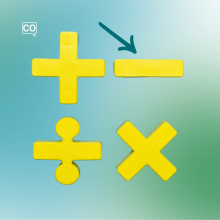Restar (to subtract) - Subjuntivo futuro perfecto, subjuntivo (Future perfect subjunctive, subjunctive) - Spanish

Restar - Conjugation of to subtract in Spanish: Conjugation table, examples and exercises in the future perfect subjunctive, subjunctive tense (Subjuntivo futuro perfecto, subjuntivo).
Subjuntivo futuro perfecto, subjuntivo (Future perfect subjunctive, subjunctive)
All conjugations and tenses: Restar (to subtract) - conjugation and tenses - (Spanish)
Syllabus: Spanish lesson - Números y contar (Numbers and counting)
Conjugation of to subtract in Subjuntivo futuro perfecto
- yo hubiere restado I will have subtracted
- tú hubieres restado you will have subtracted
- él/ella hubiere restado he would have subtracted
- nosotros/nosotras hubiéremos restado we will have subtracted
- vosotros/vosotras hubiereis restado you will have subtracted
- ellos/ellas hubieren restado they will have subtracted
Example phrases
- Espero que yo hubiere restado todos los errores para entonces. I hope I will have subtracted all the errors by then.
- Es probable que tú hubieres restado los costos adicionales. It is likely that you will have subtracted the additional costs.
- Es posible que él/ella hubiere restado la cantidad correcta. It is possible that he/she might have subtracted the correct amount.
- Dudo que nosotros/nosotras hubiéremos restado todas las cifras. I doubt that we would have subtracted all the figures.
- No creo que vosotros/vosotras hubiereis restado cada detalle. I do not believe that you lot would have subtracted every detail.
- Es improbable que ellos/ellas hubieren restado los valores exactos. It is unlikely that they would have subtracted the exact values.
Exercise: Conjugate the verbs - restar (to subtract)
Instruction: Choose the correct word, read the sentence out loud and translate.
Show answers Show translationRestar (Subjuntivo futuro perfecto, subjuntivo)
1. Es posible que él/ella ... la cantidad correcta.
2. Dudo que nosotros/nosotras ... todas las cifras.
3. Es probable que tú ... los costos adicionales.
4. No creo que vosotros/vosotras ... cada detalle.
5. Espero que yo ... todos los errores para entonces.
6. Es improbable que ellos/ellas ... los valores exactos.